Related Research Articles

Philip Kindred Dick, often referred to by his initials PKD, was an American science fiction writer and novelist. He wrote 44 novels and about 121 short stories, most of which appeared in science fiction magazines during his lifetime. His fiction explored varied philosophical and social questions such as the nature of reality, perception, human nature, and identity, and commonly featured characters struggling against elements such as alternate realities, illusory environments, monopolistic corporations, drug abuse, authoritarian governments, and altered states of consciousness. He is considered one of the most important figures in 20th century science fiction.
"Second Variety" is a science fiction novelette by American writer Philip K. Dick, first published in Space Science Fiction magazine, in May 1953. Set in a world where war between the Soviet Union and United Nations has reduced most of the world to a barren wasteland, the story concerns the discovery, by the few remaining soldiers left, that self-replicating robots originally built to assassinate Soviet agents have gained sentience and are now plotting against both sides. It is one of many stories by Dick examining the implications of nuclear war, particularly after it has destroyed much or all of the planet.
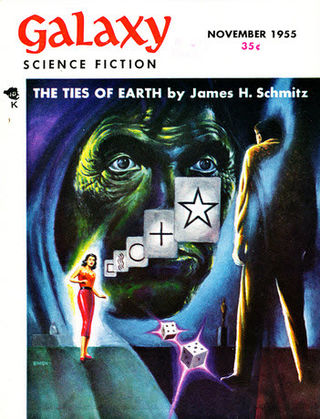
"Autofac" is a 1955 science fiction novelette by American writer Philip K. Dick that features one of the earliest treatments of self-replicating machines. It appeared originally in Galaxy Science Fiction of November 1955, and was reprinted in several collections, including The Variable Man published in 1957, and Robots, Androids, and Mechanical Oddities published in 1984.
"Null-O" is a 1958 science fiction short story by American writer Philip K. Dick. It examines the concept of totally unempathic and 'logical' humans ("Null-Os") in a parody of the plot and concepts of The Pawns of Null-A by A. E. van Vogt. These beings view individual collections of matter, i.e. any object, as subjective structures and see the true state of reality as an 'undifferentiated world of pure energy'. They can also move their ears independently, giving them excellent hearing. After attaining positions of power they proceed with a plan to ultimately return everything in the universe to this state. This is to be done by the construction of successively more powerful bombs, ultimately resulting in the rather improbable 'U-bomb' that will homogenise the whole universe. The Null-O plan is halted, however, when the 'ordinary' people of the world, who have survived the nuclear destruction of Earth's surface in the shelters built by their employers, rise up in drilling machines to stop the construction of an 'E-Bomb' designed to destroy Earth, and succeed in destroying both the E-Bomb prototype and the Null-O's themselves.

"Strange Eden" is a science fiction short story by American writer Philip K. Dick. It was first published in Imagination magazine during 1954, found under Second Variety and Other Classic Stories by Philip K. Dick in pp. 111–121.
"Sales Pitch" is a science fiction short story by American writer Philip K. Dick, first published in Future Science Fiction magazine, June 1954. The premise is the omnipresent, intrusive and even aggressive advertising and marketing. At the end of the story, the protagonist is driven mad by a robot who can forcefully market himself, and refuses to take no for an answer. The subject was of concern to Dick, and features in his early works such as The Man Who Japed.
"Foster, You're Dead!" is a 1955 science fiction short story by American writer Philip K. Dick. It was first published in Star Science Fiction Stories No.3.
"Breakfast at Twilight" is a science fiction short story by American writer Philip K. Dick. It was received by the Scott Meredith Literary Agency on January 17, 1953 and first published in Amazing Stories, July 1954. It appears in the second volume reprint of Philip K. Dick's short stories Second Variety.
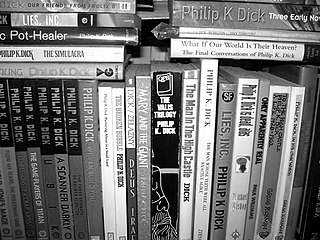
The bibliography of Philip K. Dick includes 44 novels, 121 short stories, and 14 short story collections published by American science fiction author Philip K. Dick during his lifetime.
"The Trouble With Bubbles" is a 1953 science fiction short story by American writer Philip K. Dick. The story first appeared in If magazine, September 1953, and was first printed in book form in Second Variety, volume two of the five-volume The Collected Stories of Philip K. Dick, in 1987.
"Human Is" is a science fiction short story by American writer Philip K. Dick. It was first published in Startling Stories, Winter 1955. The plot centers on the crisis facing a woman whose cold and emotionally abusive husband returns from a survey mission to the dying planet Rexor IV, changed for the better—his psyche was replaced by a Rexorian, glad to have escaped the confines of its dying planet.

The Best of Philip K. Dick is a collection of science fiction stories by American writer Philip K. Dick. It was first published by Del Rey Books in 1977 as a volume in its Classic Library of Science Fiction. Many of the stories had originally appeared in the magazines Planet Stories, Fantasy and Science Fiction, Space Science Fiction, Imagination, Astounding Stories, Galaxy Science Fiction, Amazing Stories, Science Fiction Stories and Startling Stories, as well as the anthologies Dangerous Visions and Star Science Fiction Stories No.3.

The Collected Stories of Philip K. Dick is a collection of 118 science fiction stories by American writer Philip K. Dick. It was first published by Underwood-Miller in 1987 as a five volume set. See Philip K. Dick bibliography for information about the mass market reprints.
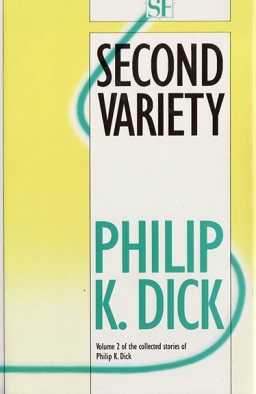
Second Variety is a collection of science fiction stories by American writer Philip K. Dick. It was first published by Gollancz in 1989 and reprints Volume II of The Collected Stories of Philip K. Dick. It had not previously been published as a stand-alone volume. Many of the stories had originally appeared in the magazines Fantasy Fiction, Fantastic Universe, Space Science Fiction, Imagination, If, Amazing Stories, Science Fiction Quarterly, Startling Stories, Cosmos, Orbit, Astounding and Planet Stories. The 1990 Citadel collection We Can Remember It for You Wholesale is identical except that it has "We Can Remember It for You Wholesale" instead of "Second Variety".
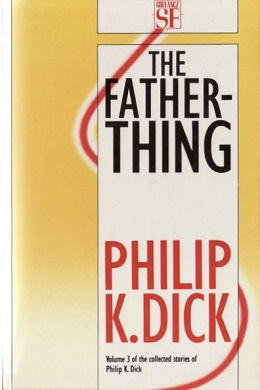
The Father-Thing is a collection of science fiction stories by American writer Philip K. Dick. It was first published by Gollancz in 1989 and reprints Volume III of The Collected Stories of Philip K. Dick. It had not previously been published as a stand-alone volume. Many of the stories had originally appeared in the magazines If, Science Fiction Adventures, Science Fiction Stories, Orbit, Fantasy and Science Fiction, Imagination, Future, Galaxy Science Fiction, Beyond Fantasy Fiction, Satellite, Science Fiction Quarterly and Imaginative Tales.
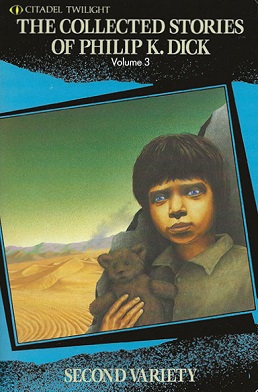
Second Variety is a collection of science fiction stories by American writer Philip K. Dick. It was first published by Citadel Twilight in 1991 and reprints Volume III of The Collected Stories of Philip K. Dick with the addition of the story "Second Variety". Many of the stories had originally appeared in the magazines If, Science Fiction Adventures, Science Fiction Stories, Orbit, Fantasy and Science Fiction, Imagination, Future, Galaxy Science Fiction, Beyond Fantasy Fiction, Satellite, Science Fiction Quarterly, Imaginative Tales and Space Science Fiction. There is huge overlap with the 1997 The Philip K. Dick Reader: stories 1–20 and 24 are identical.

The Philip K. Dick Reader is a collection of science fiction stories by American writer Philip K. Dick. It was first published by Citadel Twilight in 1997. Many of the stories had originally appeared in the magazines If, Science Fiction Adventures, Science Fiction Stories, Orbit, Fantasy and Science Fiction, Imagination, Future, Galaxy Science Fiction, Beyond Fantasy Fiction, Satellite, Imaginative Tales, Fantastic Universe and Space Science Fiction. It is identical in content and order to the edition of volume 3 of the Collected Stories of Philip K. Dick produced by the same publisher apart from the substitution of three stories in positions 21-23 of 24 and the omission of the end notes in the Collected Stories edition. At press time, stories 21 and 24 had already been made into successful movie adaptations and stories 22 and 23 had been optioned.

Philip K. Dick's Electric Dreams, or simply Electric Dreams, is a science fiction television anthology series based on the works of Philip K. Dick. The series consists of ten standalone 50-minute episodes based on Dick's work, written by British and American writers. It premiered on Channel 4 in the United Kingdom on 17 September 2017, and in the United States on Amazon Prime Video on 12 January 2018.
"The Hanging Stranger" is a science fiction-horror short story by American writer Philip K. Dick, originally published in December 1953 in the magazine Science Fiction Adventures. It has been reprinted in several anthologies, and published in French, Italian and German. It was adapted by Dee Rees into the episode "Kill All Others" or "K.A.O." for the 2017 television series Philip K. Dick's Electric Dreams. A book was also released to republish "The Hanging Stranger" along with the nine other stories on which the Electric Dreams episodes were based.

"The Impossible Planet" is a science fiction short story by American writer Philip K. Dick, first published in the October 1953 issue of Imagination. It has been reprinted over 30 times, including Brian Aldiss's 1974 Space Odysseys anthology. It was also published in Dutch, French, German and Italian translations. The writer originally submitted it to the Scott Meredith Literary Agency on February 11, 1953, with the title "Legend."
References
- ↑ Farrell, Henry (16 January 2018). "Philip K. Dick and the Fake Humans". Boston Review. Retrieved 2018-02-28.
- ↑ The Father-Thing (Forward). RosettaBooks. 2010. ISBN 9780795317132.
- ↑ "The Collected Stories of Philip K. Dick, Volume 3: The Father-Thing". www.goodreads.com. Retrieved 2018-02-28.
- ↑ "The Collected Stories of Philip K. Dick 3: Second Variety". goodreads.com. Retrieved 2018-02-28.
- ↑ Film Crit Hulk (13 January 2018). "Phillip K. Dick's Electric Dreams Recap: Daddy Issues". Vulture. Retrieved 2018-02-28.
- ↑ Ryan, Maureen (11 January 2018). "TV Review: 'Philip K. Dick's Electric Dreams' on Amazon". Variety. Retrieved 2018-02-28.